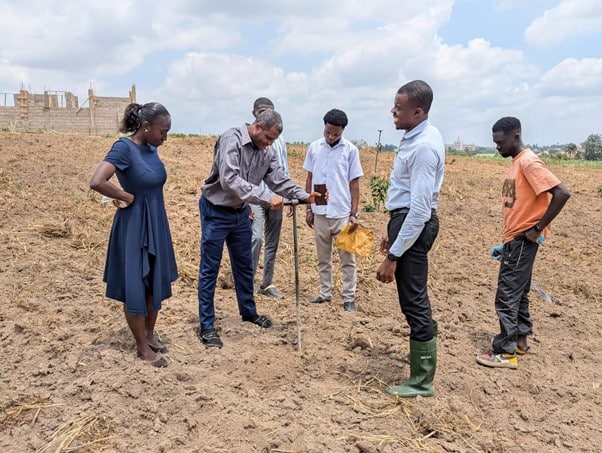
The Council for Scientific and Industrial Research – Crops Research Institute (CSIR-CRI) has embarked on a significant soil mapping initiative under the Agroecology and Circular Economy for Ecosystem Services (ACE4ES) project. This initiative aims to promote sustainable agricultural practices and strengthen ecosystem services across several African countries, including Ghana, Nigeria, Benin, and Tanzania.
Led by experts in soil science, agronomy, and GIS technology, the soil mapping exercise will gather crucial information about soil characteristics across diverse agro-ecological zones. This data will inform the implementation of agroecological methods, such as crop diversification, composting, and biochar application, to improve soil fertility, reduce greenhouse gas emissions, and enhance climate resilience.
The ACE4ES project prioritizes reducing Short-Lived Climate Pollutants (SLCPs), including methane and black carbon, in agriculture. Soil mapping plays a pivotal role in this effort by providing a comprehensive understanding of soil properties. This information enables the team to recommend targeted agroecological practices that enhance soil health, crop yields, and environmental sustainability.
Dr. Kwaku Onwona-Hwesofour Asante, lead scientist of the ACE4ES project, stressed the importance of the initiative, stating, “This soil mapping exercise will offer us precise, location-specific data, enabling us to tailor agroecological practices for different regions. It’s crucial for improving soil fertility and reducing emissions in key crops like maize and rice.”
The initiative will utilize advanced Geographic Information Systems (GIS) and remote sensing technologies to create detailed soil maps. These maps will guide researchers in identifying areas that require specific soil management techniques, such as fertilizer application, erosion control, and irrigation management.
Dr. Jeannette Aduhene-Chinboah, Head of the Soil Science Unit at CSIR-CRI, highlighted the transformative role of modern technology in soil research. “With GIS and remote sensing, we can now generate high-resolution soil maps that allow us to apply agroecological interventions with precision. This leads to better resource management, higher crop yields, and a reduced environmental footprint,” she said.
Agronomist Dr. Eric Owusu Danquah explained the practical advantages for farmers: “Soil mapping provides us with the foundation to understand the specific needs of farmers. By applying the right techniques based on soil conditions, we help farmers boost productivity while conserving valuable resources.”
Dr. Clement Oppong Peprah, also an agronomist on the team, emphasized the long-term benefits of this initiative, noting, “This mapping exercise allows us to create sustainable agricultural solutions tailored to the unique soil conditions of each region, building resilience for both the land and the farmers.”
The soil mapping data will also support the creation of a 15-acre Multicultural Technology Park at CSIR-CRI under the ACE4ES project. This research hub will serve as a center for agroecology and circular economy studies, fostering collaboration among researchers from across Africa.
The initiative’s capacity-building efforts will ensure that farmers are equipped with the knowledge and tools to apply agroecological practices effectively, leading to improved food security, resilient livelihoods, and sustainable development.
As the ACE4ES project advances, the results of this soil mapping exercise will serve as a cornerstone for future research and implementation. The project’s integration of agroecology and circular economy principles is expected to contribute significantly to climate change mitigation and agricultural sustainability in Sub-Saharan Africa.
The CSIR-CRI Soil Science and Agronomy Team remains dedicated to advancing agricultural research and ensuring that the ACE4ES project delivers lasting environmental, economic, and social benefits across Africa.
Swanwick House, 22 Towcester Road, Old Stratford, Milton Keynes, MK19 6AQ, UK
© 2025 Project Management Global. All rights reserved | Privacy Policy